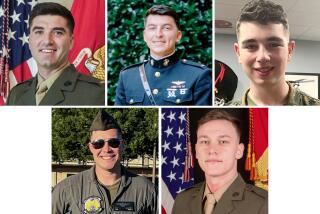Marines Write to Comfort Kin of Comrades, and Themselves
FALLOUJA, Iraq — On the ground floor of a squalid public-housing project turned makeshift military base, sad letters are being written.
Marines are writing to the families of those killed during the initial push to rid this Sunni Triangle city of insurgents.
“Your husband/son/brother was an excellent Marine, admired by his peers, respected by his superiors, and he died doing his duty,” many of the letters will say, or versions thereof.
Among the fallen Marines is Lance Cpl. Robert Zurheide, 20, of Tucson, whose wife will soon give birth to their first child. His buddies want to make sure that someday Zurheide’s child will know of his sense of humor, strength of character and bravery.
No law requires these letters to be written, only custom. In the Marine Corps, custom is a potent call.
“Words can’t stop the family’s pain, but at least we can tell them there are others grieving alongside them,” said Lt. Col. Gregg Olson, commanding officer of the 2nd Battalion, 1st Regiment of the 1st Marine Division. He has had to write several of these letters, and more are possible as the Marines stand ready to assault the insurgent stronghold in the core of the city.
The letters may take weeks to be delivered. Letters from officers are being collected here at the Marine encampment on the city’s outskirts. They are being typed and corrected for spelling.
But enlisted Marines, some hunkered down in bullet-riddled homes awaiting orders to begin an assault, also are encouraged to write down their memories. Some use scraps of paper, others the sides of cardboard boxes that carry Meals Ready to Eat.
Troops remembered Zurheide’s sense of humor, his love of singing and playing guitar, his occasional displays of dancing and his joy at showing the ultrasound picture of his unborn child.
“We want his child to know his dad was a good Marine. He never balked, he always volunteered, he went out of his way to help others,” said 2nd Lt. Ben Wagner, commanding officer of Zurheide’s platoon.
The chaplain also will write a letter, reminding Zurheide’s widow that as a woman of faith, she knows that someday she and her husband will be reunited. Until then, said Lt. Scott Radetski, the letters and small memories “will help bridge the gap.”
The formal notification process -- the dreaded “knock on the door” -- will already have taken place, within a few days of the death. An officer in dress blues, other Marines, a chaplain and sometimes a medic will bring the news to the family.
Letters are considered a “follow-on.” They will arrive after the funeral and the initial rush of support from families and friends -- as the chronic ache has begun to set in.
“It is clear to all who knew [the Marine] that he was raised by loving parents,” said a letter to the mother and father of a young man killed in a firefight.
When mail delivery is too slow, messages can be relayed by e-mail from a Marine at one of the larger encampments with Internet connections. That is being done for the family of Lance Cpl. Brad Shuder, 21, of El Dorado Hills east of Sacramento, who died in the same firefight as Zurheide.
Shuder’s funeral is scheduled for Friday, and members of his platoon want their comments included. “His family was legendary in its support of the Marines,” Wagner said.
Capt. James Zembiec said the letters “can never be enough” to ease the family’s pain. He has written to the kin of Shuder and Zurheide.
“I hope what I wrote will at least let them know their sons didn’t die in vain,” he said. “They died trying to bring peace to a violent and chaotic part of the world.”
The letter-writing process helps the surviving Marines as well. They take comfort in the thought that the missives are helping a dead friend’s family.
“That’s how Marines grieve,” said 1st Sgt. James Madden, who has been in the Corps for 22 years. “We take care of our own.”
More to Read
Sign up for Essential California
The most important California stories and recommendations in your inbox every morning.
You may occasionally receive promotional content from the Los Angeles Times.










